

Teaching Group Work: Building Student Collaboration and Agency. At University Park Campus School (UPCS), group work is an integral part of the culture.
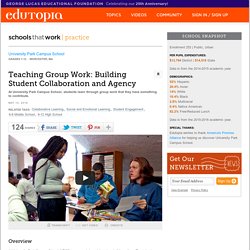
The school practices group work across all grades and subjects, and students see collaborative problem-solving modeled by their teachers and administration. Through group work, they learn that there's a diversity of valid perspectives, build comfort around using their own voices, and understand the value of accepting and building on the contributions of others. "The world increasingly relies on people being able to work together to collaboratively solve problems," says Dan St. Louis, University Park Campus School's principal. “The problems of today’s society are difficult. The seventh-grade curriculum at University Park includes a strong focus on building foundational group-work skills.
Hack Your Classroom - Week One: Developing a growth mindset. This week we will aim to explore the idea of developing a 'growth mindset' and how it can help to support teachers becoming more innovative and moving towards 'adaptive expertise'.
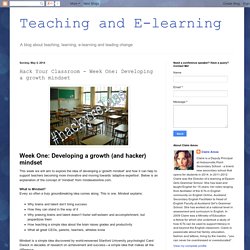
Below is an explanation of the concept of 'mindset' from mindesetonline.com.What is Mindset? Every so often a truly groundbreaking idea comes along. This is one. Mindset explains:Why brains and talent don’t bring successHow they can stand in the way of itWhy praising brains and talent doesn’t foster self-esteem and accomplishment, but jeopardizes themHow teaching a simple idea about the brain raises grades and productivityWhat all great CEOs, parents, teachers, athletes know Mindset is a simple idea discovered by world-renowned Stanford University psychologist Carol Dweck in decades of research on achievement and success—a simple idea that makes all the difference.
In a fixed mindset, people believe their basic qualities, like their intelligence or talent, are simply fixed traits. Rube Goldberg Machines and the Engineering Design Process. Rube Goldberg – a comically involved, complicated invention, laboriously contrived to perform a simple operation. ~ Webster’s New World Dictionary When Rube Goldberg walked away from his engineering career in 1904, it’s unlikely he realized the impact that he would have on 21st century education.
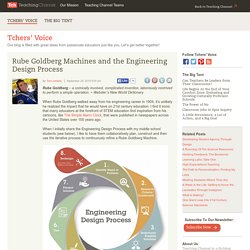
I find it ironic that many educators at the forefront of STEM education find inspiration from his cartoons, like The Simple Alarm Clock, that were published in newspapers across the United States over 100 years ago. When I initially share the Engineering Design Process with my middle school students (see below), I like to have them collaboratively plan, construct and then use the iterative process to continuously refine a Rube Goldberg Machine. A wonderful byproduct of this project is that I’m able to pre-assess my new students in many areas of physical science without using a paper test. Tom Jenkins teaches both middle school science and STEM in Enon, Ohio. How To Grow Your Intelligence Graphic - Growth Mindset Blog & Newsletter. Hack Your Classroom: Week Nine - Making future-focused innovative teaching infectious!
Welcome to the last official post for Hack Your Classroom!
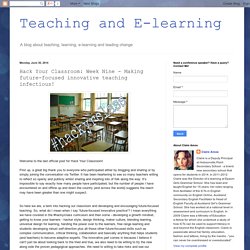
First up, a great big thank you to everyone who participated either by blogging and sharing or by simply joining the conversation via Twitter. It has been heartening to see so many teachers willing to reflect so openly and publicly whilst sharing and inspiring lots of folk along the way. It's impossible to say exactly how many people have participated, but the number of people I have encountered on and offline up and down the country (and across the world) suggests the reach may have been greater than one might suspect. Hack your classroom: Week Eight - Going free-range and developing robust self-direction. I believe self-direction and developing student agency and efficacy is the fundamental shift all educators need to make to become more futur-focused in their practice.
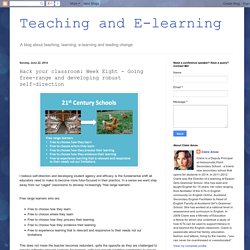
In a sense we want step away from our 'caged' classrooms to develop increasingly 'free range learners'. Free range learners who are: Free to choose how they learnFree to choose where they learnFree to choose how they process their learningFree to choose how they evidence their learningFree to experience learning that is relevant and responsive to their needs not our limitations This does not mean the teacher becomes redundant, quite the opposite as they are challenged to provide authentic relevant contexts for learners, with just enough 'enabling constraints' to ensure that our little chickens don't accidentally cross the road...in heavy traffic.
Hack Your Classroom - Week Seven: Handing the power over to the learners. Interestingly, when it comes to teachers not really adopting and embracing technology it often isn't technical skill or lack thereof that is the problem, it is the teachers need to maintain power and control in the classroom.
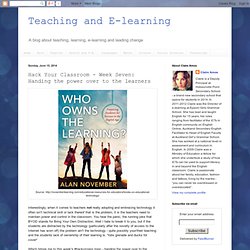
You hear the panic, the running joke that BYOD stands for Bring Your Own Distraction. Well I hate to break it to you, but if the students are distracted by the technology (particularly after the novelty of access to the Internet has worn off) the problem ain't the technology - quite possibly your/their teaching and the students lack of ownership of their learning is. *lobs grenade and ducks for cover* Which brings me to this week's #hackyrclass topic - handing the power over to the learners. I am really interested in this. So what can we do about this? So what are the strategies we could use to hand the power over to the learners. Anyhoo, rant is over. Hack Your Classroom: Week 6 - Meeting the Needs of Diverse Learners. This is a topic that has long been close to my heart.
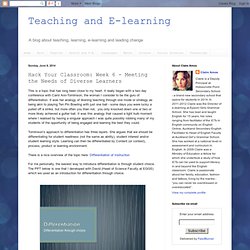
It really began with a two day conference with Carol Ann-Tomlinson, the woman I consider to be the guru of differentiation. It was her analogy of likening teaching through one mode or strategy as being akin to playing Ten Pin Bowling with just one ball - some days you were lucky a pulled off a strike, but more often you than not, you only knocked down one or two or more likely achieved a gutter ball. It was this analogy that caused a light bulb moment where I realised by having a singular approach I was quite possibly robbing many of my students of the opportunity of being engaged and learning the best they could. Tomlinson's approach to differentiation has three layers. She argues that we should be differentiating for student readiness (not the same as ability), student interest and/or student learning style.
There is a nice overview of the topic here: Differentiation of Instruction. Hack Your Classroom - Week Five: Embracing blended learning, even if you don't have many devices... Source: Well it's officially 'hump week' for the Hack Your Classroom project.
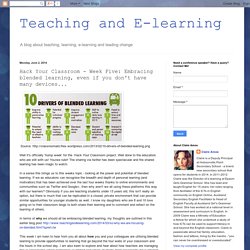
Well done to the educators who are still with us! You/we rule!! So what are you doing differently this year in your classroom (and/or school)? Whether you did a formal inquiry into your teaching practice last year or simply taught some kids and did some some stuff, one truth will remain - there are a number of things you need to change about your teaching and/or learning environment this year.
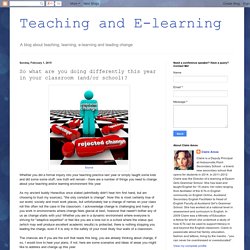
As my ancient buddy Heraclitus once stated (admittedly didn't hear him first hand, but am choosing to trust my sources), "the only constant is change". Now this is most certainly true of our world, society and most work places, but unfortunately bar a change of names on your class roll this often not the case in the classroom. I acknowledge change is challenging and many of you work in environments where change feels glacial at best, however that needn't bother any of us as change starts with you! Graffiti Creator. Hack Your Classroom - Week One: Developing a growth mindset.